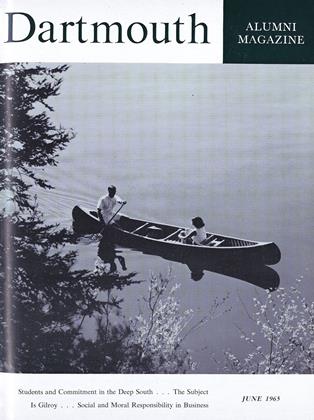By Paul Reps '18. Illustrated.1964. 101 pp. $2.50. UNWRINKLINGPLAYS. By Mr. Reps. Illustrated.1965. 57 pp. $2.95. ZENFLESH ZEN BONES. Compiled by Mr.Reps. 1964. 211 pp. $3.25. ALL publishedby Charles E. Tuttle Co., Rutland,Vt. and Tokyo, Japan.
These three little charming books, containing the "flesh and bones" of Zen (101 stories, 49 "koans," Ten Bull Pictures), "plays," and "telegrams" (picture-poems) are varied but all aim at sudden flashes of insight, which is the goal of Zen. This branch of Buddhism transmits its doctrines "from mind to mind without the use of the written word."
Mr. Reps, who has lived for many years in Japan and who has not only understood but also lived Zen, is here transmitting to us with the simplest of pictures and very few words. The "Unwrinkling Plays" are cryptic (Example: Young man knocks at door. Girl opens door. He sits down. After some time, he rises, bows, and leaves), and the "telegrams" are even more so (Example: two lines representing a bird, three representing a fish, and the words "who is). All this seems mystical and puzzling. But if one possess" the proper mind, one can readily attain an instant understanding of the truth. One of the stories tells us that when a teacher was asked about Zen, he simply kept on pouring water over a cup that was already full. At first puzzled, the student soon understood that no one can understand Zen without an open mind. There is nothing mysterious about this simple moral.
Even the "koans" or Zen questions and answers, which have often been described as an enigma, are easily understood if one is in the proper mental state. When one asked what the Buddha is and the answer was "three pounds of flax" (no. 18), the answer is not nonsense but a suggestion that the Buddha cannot be understood in conceptual or quantitative terms. And when one asked whether it was the wind that moved the bell or the bell that moved the wind and the answer was neither but the mind moved them (no. 29), it means that most things we see are based on subjective viewpoints.
One must always be alert (no. 12) and make no artificial or conventional distinctions of what we think as good and evil (no. 23). The mind must be pure, open, free, and absolutely spontaneous. With such a mind, one can easily understand, for example, that one's true being consists in living naturally like the flying bird and the swimming fish, and that true friendship means togetherness but requires no words. Mr. Reps' short, suggestive, and often challenging plays and poems, and his vigorous but graceful brush strokes in his many pictures are all meant to keep us alert, stimulate our minds, strike our imagination, and sensitize our conscience.
The three beautiful lines that are a picture of grasses are not only beautiful to look at but also an inexhaustible source of inspiration, for there in the grass may be the essence of the Buddha, the reality of being, and the creation of Nature of which we are but a part. In these beautiful strokes and other drawings Mr. Reps reveals himself as a good calligrapher as well as a poet. All in all, the three volumes are a feast for the mind.
Professor of ChineseCulture and Philosophy
 View Full Issue
View Full Issue
More From This Issue
-
 Feature
FeatureStudents and Commitment in the Deep South
June 1965 By BERNARD E. SEGAL '55, -
 Feature
FeatureTHE SUBJECT IS GILROY
June 1965 By RAYMOND BUCK '52 -
 Feature
FeatureSocial and Moral Responsibility in the Modern Corporation
June 1965 By RODMAN C. ROCKEFELLER '54 -
 Feature
FeatureRETIRING PROFESSORS
June 1965 -
 Article
ArticleWITH THE BIG GREEN TEAMS
June 1965 By ERNIE ROBERTS -
 Article
ArticleTHE UNDERGRADUATE CHAIR
June 1965 By BOB WILDAU '65
WING-TSIT CHAN
Books
-
 Books
BooksBriefly Noted
MAY 1967 -
 Books
BooksTHE NORMAL CEREBRAL ANGIOGRAM,
January 1952 By HENRY L. HEYL, M.D -
 Books
BooksThe Private Papa
June 1981 By J. D. O'Hara Jr. '53 -
 Books
BooksINTERNATIONAL SHIPPING CARTELS.
June 1953 By J. S. Ransmeier -
 Books
BooksEXETER IN 1830. By William Gilman Perry 1842 M.D. EXETER IN 1776.
FEBRUARY 1973 By JOHN H URD '21 -
 Books
BooksProselytizers and Profiteers
May 1977 By LEO SPITZER





